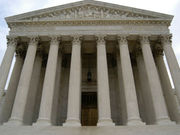Friend-of-the-court brief reflects concern that the ruling will have negative impact on physicians
FRIDAY, June 2, 2017 (HealthDay News) — A court ruling allowing a civil rights lawsuit against a medical examiner may have serious consequences for physicians in public service, according to a report published by the American Medical Association.
The case involves a Texas medical examiner who compiled an autopsy report for a woman who had died from a gunshot wound, concluding that the woman had died from a homicide. After an initial trial of her former husband resulted in a hung jury, the charges were dropped during retrial when the medical examiner’s office indicated that the cause of death was changed to undetermined following the medical examiner’s cross-examination in court.
The husband sued the medical examiner for violation of his federal civil rights. The defendant moved for summary judgement, arguing that duties had been fulfilled in good faith and therefore led to entitlement of immunity. The U.S. District Court for the Southern District of Texas said that qualified immunity did not apply, allowing the plaintiff to proceed with the lawsuit. The defendant is asking the 5th U.S. Circuit Court of Appeals in New Orleans to overturn the federal court decision allowing the civil rights lawsuit to proceed. Several societies filed a friend-of-the-court brief asking the court to apply qualified immunity, noting their concern that the ruling will have a negative impact on forensic pathologists and other government-employed physicians.
“The district court’s holding will have a chilling effect on medical examiners and other physicians who will, unable to reasonably anticipate what actions will subject them to liability, act to avert liability rather than act according to medical science and their patients’ best interest,” the friend-of-the-court brief states.
Copyright © 2017 HealthDay. All rights reserved.








